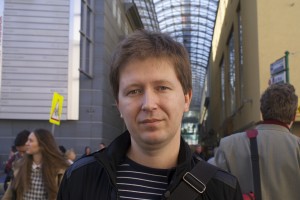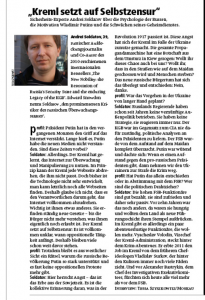
Security expert Andrei Soldatov talks about the psychology of the Russians, Vladimir Putin`s motivation and the weaknesses of his security services.
Andrei Soldatov, 39, is a Russian expert for security services and co-author of the international bestseller “The New Nobility: the Restoration of Russia’s Security State and the enduring Legacy of the KGB” (2010). Whistle blower Edward Snowdon calls Soldatov “the most prominent critic of the Russian police state”.
Profil: For a long time it was assumed that Vladimir Putin had not understood the power of the social media. But in the past year the Kremlin has cracked down on the Russian internet. Does the president finally understand the importance of the cyberspace?
Soldatov: Yes, indeed. The Kremlin has learned to use the internet for surveillance and manipulation. In principle the people in power could close down any website which they don’t like. But so far the technology is not developed enough. You could still find these websites if you really wanted to. I don’t believe they want to shut them down completely. Important is something else. The authorities constantly invent new laws – until the citizens cannot understand anymore, what they are still allowed to do or not. The Kremlin works with self-censorship: As it is totally unclear, what counts as oppositional occupation, many stop far before it looks like it in order to avoid any problems.
Profil: It is hard to understand for Western observers why the Russian population still supports Putin to this extent and why there are hardly any protests against him.
Soldatov: This is the heritage of the Soviet Union – fear governs most people in Russia. It is the collective memory of the revolution 1917. Kremlin used this fear in the case of Ukraine. There was one big message that the whole propaganda machine drew from the political turmoil in Kiev: Do you want this chaos here in Russia, too? Do you want people to get shot and killed like on Maidan? The new Russian middle class thought about it and decided: No, thank you.
Profil: Did Putin decide about the Ukrainian adventure by himself or under the influence of the FSB? Who is behind the annexation of Crimea and the war in Eastern Ukraine?
Soldatov: The high rank of the FSB is well paid, they are content and rather passive. Ten years ago it was different, they were still hungry and wanted to change the country according to their style. The Ukrainian war is driven by some adventurous people in the Kremlin. They want more. Vyacheslav Volodin, for example, he is the deputy chief of the Kremlin administration. The Crimean adventure was his idea. He inherited the job from former chief ideologue Vladislav Surkov, a man who is still very active behind the scenes. And also Alexander Bastrykin, chief of the “Investigative Executive Committee”. He is the man most people fear more than the FSB.



